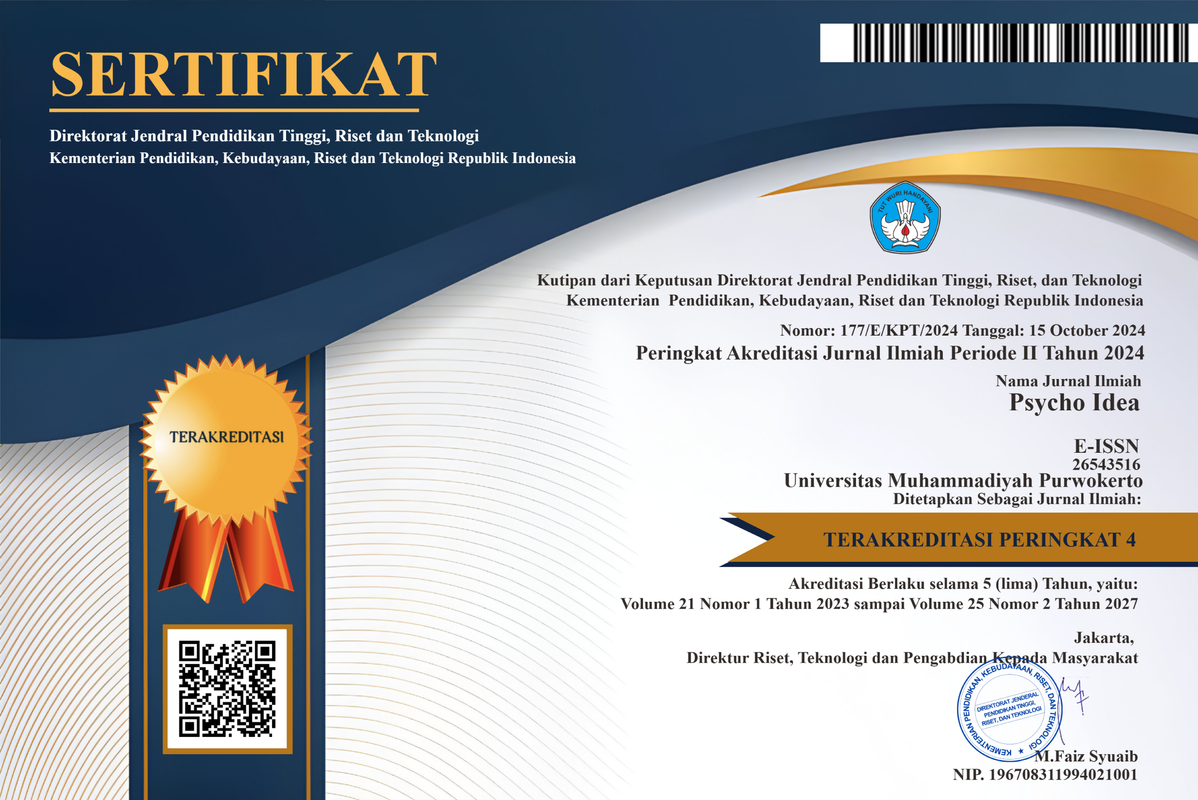Smartphone Addiction Ditinjau dari Subjective Well Being, Kecemasan Sosial, dan Materialisme pada Mahasiswa Di Universitas “Y”
DOI:
https://doi.org/10.30595/psychoidea.v17i2.4029Keywords:
kecemasan sosial, materialisme, smartphone addiction, subjective well beingAbstract
Di zaman milineal ini, segala sesuatu dapat diakses melalui satu genggaman tangan, yakni melalui smartphone. Berbagai informasi, hiburan, dan sarana komunikasi dapat mudah diakses dengan beragam aplikasi yang ditawarkan pada smartphone. Berbagai keuntungan yang diperoleh sari smartphone ini seringkali membuat para penggunanya sulit melepaskan dirinya dari smartphone. Penggunaan berlebih pada smartphone yang dapat menyebabkan berbagai dampak negatif seringkali disebut dengan smartphone addiction. Smartphone addiction dapat disebabkan oleh beberapa hal, antara lain subjective well being, kecemasan sosial, dan materialisme. Tujuan dari penelitian ini adalah melihat hubungan subjective well being, kecemasan sosial, dan materialisme dengan smartphone addiction pada mahasiswa di universitas "Y". Subjek penelitian berjumlah 361 mahasiswa. Metode penggumpulan data menggunakan skala smartphone addiction, skala subjective well being, skala kecemasan sosial, dan skala materialisme. Analisis data menggunakan analisis regresi linier berganda yang menghasilkan nilai p<0,005 dengan nilai Fhitung > Ftabel (18,757>2,70). Artinya terdapat hubungan antara subjective well being, kecemasan sosial, dan materialisme dengan smartphone addiction pada mahasiswa di universitas "Y". Nilai r2 sebesar 0,365 menunjukkan bahwa subjective well being, kecemasan sosial, dan materialisme memberikan sumbangan efeketif sebesar 36,5% pada smartphone addictionReferences
Aljomaa, S. S., Al Qudah, M. F., Albursan, I. S., Bakhiet, S. F., & Abduljabbar, A. S. (2016). Smartphone Addiction among University Students in the Light of Some Variables. Computers in Human Behavior, 61, 155-164. doi: 10.1016/j.chb.2016.03.041.
Cha, S. S. & Seo, B. K. (2018). Smartphone Use and Smartphone Addiction in the Middle School Students in Korea: Prevalence, Social Networking Service, and Game Use. Health Psychology Open, 5, 1-15. doi: 10.1177/2055102918755046.
Darcin, A. E., Kose, S., Noyan, C. O., Nurmedov, S., Yilmaz, O., & Dilbaz, N. (2016). Smartphone Addiction and Its Relationship with Social Anxiety and Loneliness. Behaviour & Information Technology, 30, 505-510. doi: 10.1080/0144929X.2016.1158319.
Diener, E. (1984). Subjective Well Being. Psychological Bulletin. 95
Diener, E., Oisho, S., & Lucas, R.E. (2003). Personality, Culture, and Subjective Well Being: Emotional and Cognitive Evaluation of Life. Annual Reviews Psychology 54:403-25.
Kumalasari, F. & Ahyani, L, N. (2012). Hubungan antara Dukungan Sosial dengan Penyesuaian Diri Remaja di Panti Asuhan. Jurnal Psikologi Pitutur. 1(1), 21-31
Kumcagiz, H., Gunduz, Y. (2016). Relationship between Psychological Well-Being and Smartphone Addiction of University Students. International Journal of Higher Education, 5 (4), 144-156.
Downloads
Additional Files
Published
Issue
Section
License
Authors published in this journal agree to the following terms:
- The copyright of each article is retained by the author (s) without restrictions
- The journal allows the author(s) to retain publishing rights without restrictions
- The author grants the journal the first publication rights with the work simultaneously licensed under the Creative Commons Attribution License, allowing others to share the work with an acknowledgment of authorship and the initial publication in this journal.
- Authors may enter into separate additional contractual agreements for the non-exclusive distribution of published journal versions of the work (for example, posting them to institutional repositories or publishing them in a book), with acknowledgment of their initial publication in this journal
- Authors are permitted and encouraged to post their work online (For example in the Institutional Repository or on their website) before and during the submission process, as this can lead to productive exchanges, as well as earlier and larger citations of published work
- Articles and all related material published are distributed under a Creative Commons Attribution-4.0 International Public License (CC - BY 4.0).
License
Psycho Idea is licensed under a Creative Commons Attribution- 4.0 International Public License (CC - BY 4.0).
You are free to :
Share — copy and redistribute the material in any medium or format
Adapt — remix, transform, and build upon the material for any purpose, even commercially











